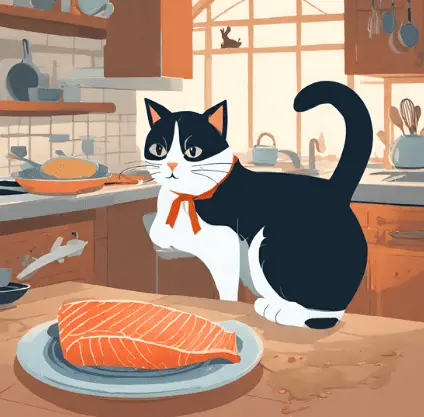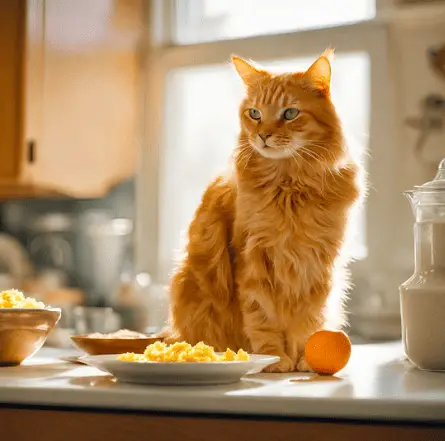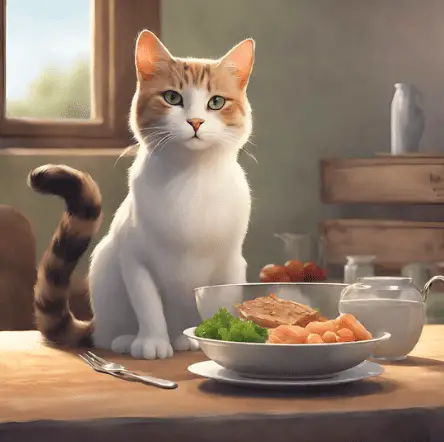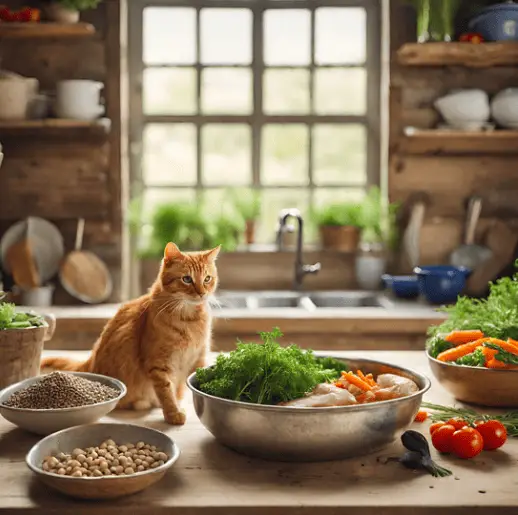
Cooked food cats – Looking to please your feline companion’s taste buds? Discover the culinary delights that will make your cat purr with satisfaction.
This caring guide offers an array of cooked foods that cats simply adore. From succulent chicken and fish to tender turkey and beef, there’s a feast fit for every discerning feline.
Don’t forget the eggs, vegetables, and rice that provide essential nutrients. Get ready to elevate your cat’s dining experience with these delectable options.
KEY TAKEAWAY
What cooked food do cats like?
While cats have individual preferences, they may enjoy cooked meat like chicken or fish, but it’s crucial to offer it in moderation and consult a vet for dietary advice.
Chicken
Do you want to try some of the juicy chicken that I just cooked up for dinner? Well, if you’re a cat owner, you might be wondering if it’s safe to share this tasty treat with your feline friend.
Cats are obligate carnivores, which means their bodies are designed to thrive on a diet that’s primarily meat-based. Chicken is an excellent source of protein for cats, providing essential amino acids that are necessary for their overall health and wellbeing.
When feeding your cat chicken, it’s important to ensure it’s cooked thoroughly. Raw chicken may contain harmful bacteria like Salmonella or Campylobacter, which can cause food poisoning in both humans and cats. Cooking the chicken at a temperature of 165°F (74°C) will kill any potential pathogens and make it safe for consumption.
Chicken isn’t only a great source of protein, but it’s also rich in essential nutrients like vitamin B12, niacin, and selenium. These nutrients play a crucial role in maintaining your cat’s immune system, promoting healthy skin and coat, and supporting proper organ function.
However, it’s essential to note that chicken should only be a part of a balanced diet for your cat. It shouldn’t replace their regular cat food, which is specially formulated to meet their unique nutritional needs.
Fish
If you’re thinking about adding fish to your cat’s diet, it’s important to choose a variety that’s safe and appropriate for their nutritional needs. Fish can be a great source of protein and omega-3 fatty acids for cats, but not all types of fish are suitable for feline consumption. Here are three types of fish that are safe and beneficial for your cat:
- Salmon: Salmon is a popular choice for cat owners due to its high omega-3 content. These fatty acids promote healthy skin and coat, as well as support brain development. Make sure to cook the salmon thoroughly and remove any bones before serving it to your cat.
- Tuna: Tuna is another fish that cats enjoy. It’s high in protein and provides essential amino acids for your feline friend. However, it should be given in moderation due to its high mercury content. Too much tuna can lead to mercury poisoning, so limit your cat’s intake to occasional treats.
- Sardines: Sardines are small, oily fish that are rich in omega-3 fatty acids and calcium. They can be a great addition to your cat’s diet, but be sure to choose boneless sardines to avoid any choking hazards.
Turkey
You can roast turkey for your cat, but make sure to remove the skin and bones before serving it. Turkey is a good source of lean protein for your feline friend. It contains essential amino acids that are necessary for their overall health and wellbeing. However, the skin and bones can pose potential risks to your cat. The skin is high in fat, which can lead to weight gain and digestive issues. Additionally, the bones can splinter and cause choking or internal injuries.
When preparing turkey for your cat, it’s important to cook it thoroughly to eliminate any potential bacteria. Raw or undercooked turkey can contain harmful pathogens such as Salmonella or Campylobacter, which can cause food poisoning in cats. It’s recommended to cook the turkey until it reaches an internal temperature of 165°F (74°C) to ensure it’s safe for consumption.
Transition: While turkey can be a tasty treat for your cat, another option to consider is beef. Let’s explore the benefits of feeding beef to your feline companion.
Beef
There are several reasons why beef can be a nutritious addition to your cat’s diet. Here are three key points to consider:
- High-Quality Protein: Beef is a great source of high-quality protein, which is essential for cats. Protein helps support muscle growth and repair, and it provides the necessary amino acids for overall health. Including beef in your cat’s diet can help ensure they get the protein they need.
- Essential Nutrients: Beef is rich in essential nutrients like iron, zinc, and B vitamins. Iron is important for oxygen transport in the body, while zinc supports immune function and skin health. B vitamins are crucial for energy metabolism and the proper functioning of the nervous system. By feeding your cat beef, you can help provide these essential nutrients.
- Palatability: Cats are known for their finicky eating habits, but many find beef to be highly palatable. Its rich flavor and aroma can entice even the pickiest eaters. Including beef in your cat’s diet can help ensure they enjoy their meals and maintain a healthy appetite.
Eggs
Do you enjoy eating scrambled eggs for breakfast? If so, you might be interested to know that eggs aren’t only a delicious breakfast option for humans but can also be beneficial for our feline friends. Eggs are a great source of protein, vitamins, and minerals that can contribute to a balanced diet for cats. When cooked thoroughly, eggs can provide a safe and healthy treat for your furry companion.
Protein is an essential nutrient for cats, as it supports muscle growth and repair. Eggs are an excellent source of high-quality protein, containing all the essential amino acids that cats need. Additionally, eggs are rich in vitamins such as vitamin A, vitamin D, and B vitamins like B12 and biotin. These vitamins play crucial roles in maintaining your cat’s overall health, including their immune system, vision, and coat condition.
However, it’s important to note that eggs should always be cooked before feeding them to your cat. Raw eggs may contain bacteria such as Salmonella, which can be harmful to both cats and humans. By thoroughly cooking the eggs, you eliminate any potential risks and ensure that your cat can safely enjoy this nutritious treat.
Transitioning into the subsequent section about vegetables, it’s worth mentioning that while eggs can be a valuable addition to your cat’s diet, they shouldn’t replace the essential nutrients found in vegetables.
Vegetables
If you’re looking to add more nutritional variety to your cat’s diet, consider mixing in some cooked vegetables, like carrots or green beans. Cats are obligate carnivores, meaning their bodies are designed to primarily consume meat. However, incorporating small amounts of vegetables into their diet can provide some additional health benefits.
Here are three vegetables that you can safely feed your cat:
- Carrots: Carrots are a good source of vitamins A, C, and K, as well as fiber. They can be cooked until soft and mashed or pureed before mixing them into your cat’s regular food. Just be sure to peel the carrots and remove any greens, as they can be toxic to cats.
- Green beans: Green beans are low in calories and rich in fiber. They can be steamed or boiled until soft and then chopped into small pieces. Green beans can be a great option for cats who need to lose weight or have digestive issues, as they can help with digestion and promote a feeling of fullness.
- Peas: Peas are a good source of vitamins A, B, and K, as well as fiber. They can be cooked until soft and mashed or pureed before being added to your cat’s food. Just make sure to avoid canned peas, as they often contain added salt, which can be harmful to cats.
Rice
Have you considered cooking some rice for your cat? It can be a great addition to their diet and provide them with energy and nutrients. Rice is a staple food for many cultures around the world, and it can also be beneficial for your feline friend. When cooked, rice becomes soft and easily digestible, making it suitable for cats with sensitive stomachs or digestive issues.
Rice is a good source of carbohydrates, which are essential for providing energy to your cat’s body. It also contains some protein and small amounts of vitamins and minerals, including niacin, thiamine, and iron. However, it’s important to note that rice shouldn’t be the sole source of nutrition for your cat. It should be served as a supplement to their regular balanced diet, which should consist mainly of high-quality cat food.
When preparing rice for your cat, make sure to cook it thoroughly and avoid adding any seasoning or spices, as they can be harmful to cats. It’s also important to serve rice in moderation, as excessive consumption can lead to digestive upset or obesity. Remember to consult with your veterinarian before making any changes to your cat’s diet, including the introduction of rice.
Conclusion
In conclusion, cats have a diverse palate when it comes to cooked food. They enjoy the taste of chicken, fish, turkey, beef, eggs, vegetables, and rice.
However, it’s important to note that not all cats have the same preferences, so it’s vital to observe their reactions and adjust their diet accordingly.
By providing a variety of cooked foods, owners can ensure their feline companions receive a well-rounded and nutritious diet.
Remember, a happy and satisfied cat is a healthy cat.

Stephanie Ansel is a well-known writer and journalist known for her unique and captivating writing style. She has written many articles and books on important topics such as the lifestyle, environment, hobbies, and technology and has been published in some of the biggest newspapers and magazines. Stephanie is also a friendly and approachable person who loves to talk to people and learn about their stories. Her writing is easy to read and understand, filled with lots of details and information, and is perfect for both kids and adults who want to learn about important topics in an interesting way.





